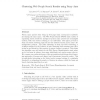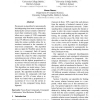142 search results - page 17 / 29 » Disambiguating Highly Ambiguous Words |
ACL
2003
13 years 9 months ago
2003
We demonstrate that an unlexicalized PCFG can parse much more accurately than previously shown, by making use of simple, linguistically motivated state splits, which break down fa...
ISCI
2010
13 years 6 months ago
2010
Person name queries often bring up web pages that correspond to individuals sharing the same name. The Web People Search (WePS) task consists of organizing search results for ambi...
WWW
2007
ACM
14 years 8 months ago
2007
ACM
Name ambiguity is a special case of identity uncertainty where one person can be referenced by multiple name variations in different situations or even share the same name with ot...
ACL
2006
13 years 9 months ago
2006
We present an algorithm for automatically disambiguating noun-noun compounds by deducing the correct semantic relation between their constituent words. This algorithm uses a corpu...
ESWS
2008
Springer
13 years 9 months ago
2008
Springer
Abstract. Geographic place names are semantically often highly ambiguous. For example, there are 491 places in Finland sharing the same name "Isosaari" (great island) tha...


